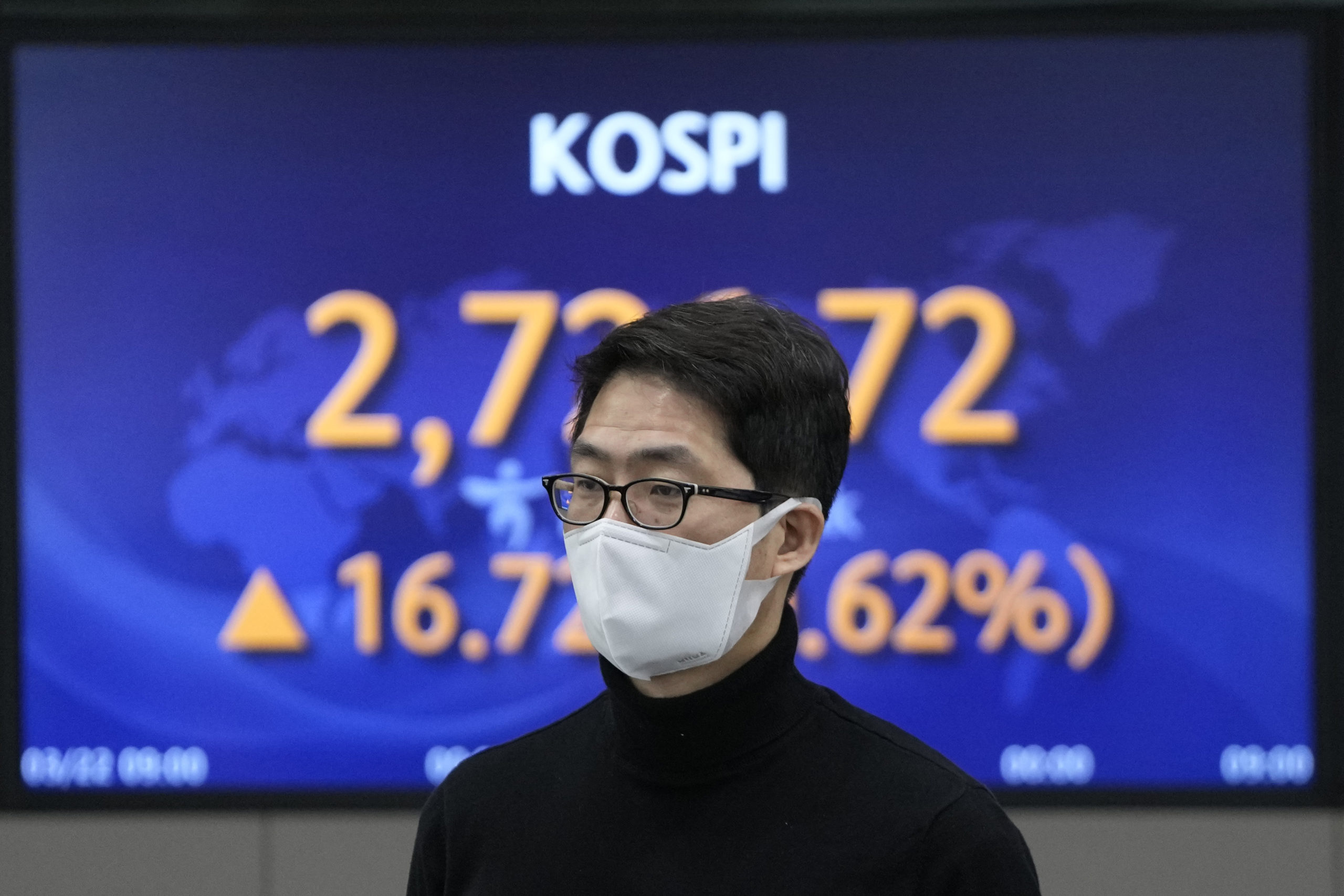 1
1 1
1
Stocks slipped Thursday in Asia following a retreat on Wall Street as crude oil prices rose sharply.
Tokyo, Hong Kong and Shanghai were lower while Sydney edged higher. U.S. futures rose and U.S. benchmark crude oil was trading near $116 per barrel.
After a rally last week, markets have been up and down this week as investors weigh concerns about rising inflation and slower economic growth.
Investors are watching to see the outcome of meetings of NATO and a European leaders summit Thursday, where President Joe Biden will huddle with key allies to discuss imposing punishing new sanctions on Russia; and dealing with the extraordinary humanitarian crisis due to its invasion of Ukraine and working on a consensus on how to respond if Russia were to launch a cyber, chemical or even nuclear attack.
The attack on Ukraine has pushed already surging energy and other commodity prices even higher.
“Pressure points are building again with oil back on the boil, resulting in stagflation weighing on sentiment again,” Stephen Innes of SPI Asset Management said in a commentary.
Tokyo’s Nikkei 25 lost 1.1% to 27,727.76. The Hang Seng in Hong Kong slipped 0.3% to 22,087.39. In Seoul, the Kospi declined 0.8% to 2,714.33, while the Shanghai Composite index gave up 0.8% to 3,246.19.
In Australia, the S&P/ASX 200 edged 0.1% higher, to 7,382.60.
The U.S. Trade Representative’s office on Wednesday reinstated exemptions for some Chinese exports to tariff hikes imposed during a fight with Beijing over its trade tactics. The exemptions, which expired earlier, apply to goods including breast pumps, swimming pool vacuum cleaners, electric motors and industrial components.
On Wednesday, the S&P 500 fell 1.2% to 4,456.24, with more than 80% of the stocks in the benchmark index closing lower. The Dow slid 1.3% to 34,358.50. Both indexes are now on pace for a weekly loss.
The Nasdaq fell 1.3% to 13,922.60. Smaller company stocks also lost ground. The Russell 2000 fell 1.7% to 2,052.21.
Energy stocks rose as crude oil prices climbed more than 5%. Hess rose 4.6% for the biggest gain in the S&P 500.
U.S. benchmark crude oil added 88 cents to $115.81 per barrel. It rose $5.66 to settle at $114.93 per barrel on Wednesday. A barrel of Brent crude, the international standard, advanced $1.28 to $119.08 per barrel. Prices are up more than 50% in 2022 so far, raising concerns about the impact on a wide range of consumer goods and consumer spending overall.
Many of the higher costs incurred by businesses have been passed on to consumers and higher prices for food, clothing and other goods could lead them to cut spending, resulting in slower economic growth. Central banks have been reacting by raising interest rates to try and counter the impact from inflation.
Bond yields have been rising overall as the market prepares for higher interest rates, but they eased back Wednesday. The yield on the 10-year Treasury fell to 2.33% from 2.37% from Tuesday.
Investors are preparing for the latest round of corporate earnings as the quarter comes to a close. Some companies are already giving updates.
Adobe fell 9.3% after giving investors a disappointing financial forecast and warned that halting sales in Russia and Belarus will impact its revenue. Metal manufacturer Worthington Industries slid 17% after reporting disappointing fiscal third-quarter profits.
Homebuilders fell sharply after the government reported that sales of new U.S. homes fell 2% in February from a downwardly revised sales total in January. While the number of resale homes on the market remains near record lows, favoring new homes, The decline comes as mortgage rates have been rising.
D.R. Horton slid 5.1% and Tri Pointe Homes fell 5.9%.
In currency trading, the U.S. dollar rose to $121.25 Japanese yen from $121.15 yen late Wednesday. The euro fell to $1.0986 from $1.1007.
___
AP Business Writers Damian J. Troise and Alex Veiga contributed. Business Writer Joe McDonald contributed from Beijing.